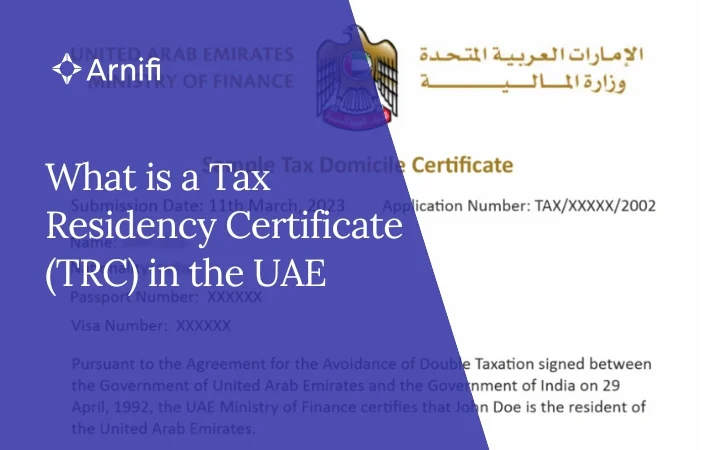What is a Tax Residency Certificate (TRC) in the UAE | Why You Might Need One?
by Shethana Jul 15, 2025  4 MIN READ
4 MIN READ

If you’re setting up a business in Dubai or anywhere else in the UAE, chances are you’ve come across the term Tax Residency Certificate, or TRC. At first glance, it sounds like a bureaucratic formality, but here’s the thing: it’s actually a very useful document, especially if you want to take full advantage of the UAE’s tax treaties with other countries.
Let’s break it down.
Table of contents
What Exactly Is a Tax Residency Certificate?
A Tax Residency Certificate is an official document issued by the UAE’s Federal Tax Authority (FTA). It confirms that either a person or a company is legally considered a tax resident in the UAE.
Why does that matter? Because the UAE has Double Taxation Avoidance Agreements (DTAA) with over 140 countries. These agreements are designed to ensure that income is not taxed in two different countries, say, once in your home country and again in the UAE. The TRC is what proves that you’re based in the UAE for tax purposes and are entitled to the benefits of these treaties.
Who Can Apply for a TRC?
There are two main categories:
- Individuals – You can apply as a resident individual if:
- You’ve lived in the UAE for at least 183 days in the last 12 months.
- You have a valid UAE residence visa.
- You can provide proof of your address (like a tenancy contract or utility bill).
- Companies – Any UAE-registered company (mainland, free zone, or offshore) can apply, provided:
- The company has been operational in the UAE for at least one year.
- It maintains an actual physical office in the UAE (not just a PO Box or virtual address).
- It holds a valid trade license and bank account.
Note: Offshore companies (like those set up in JAFZA Offshore or RAK ICC) cannot apply for a TRC. This is a common misconception. These entities are often registered in the UAE but don’t qualify for UAE tax residency under OECD rules.
Why Business Owners Should Care?
If you’re doing cross-border business, say, receiving income from another country, your home country may try to tax that income. A TRC helps you legally prove to tax authorities that you’re a UAE tax resident, so you can avoid double taxation or claim tax relief.
For example, imagine you’re a UAE-based consultant earning fees from clients in India. Without a TRC, Indian tax authorities might withhold tax on your income. But with a TRC, you can invoke the UAE-India tax treaty and avoid or reduce that tax deduction.
Documents Needed to Apply
Here’s what’s generally required for a corporate TRC application:
- Valid trade license
- Establishment card and tenancy contract
- Bank statements for the past 6 months
- Audited financials or certified management accounts
- Passport copies, visa copies, and Emirates ID of shareholders/directors
- Proof of active business operations
For individuals, the FTA usually asks for:
- Passport, visa, and Emirates ID
- Valid tenancy contract (Ejari for Dubai)
- 6-month UAE bank statements
- Salary certificate or proof of income
- Immigration report showing 183+ days of stay in the UAE
All documents must be clear, valid, and, if needed, translated into Arabic.
How Long Does It Take?
Once you’ve submitted everything correctly, the TRC is typically issued within 5 to 10 working days. The certificate is valid for one year and needs to be renewed annually if you continue to benefit from tax treaties.
What’s the Cost?
Government fees for a TRC in the UAE (as of 2025):
- AED 500 for individuals
- AED 1,750 for companies
(Additional service or attestation fees may apply if you’re working with a consultant.)
When Should You Apply?
If your business is active and you’re earning income from overseas, it’s smart to get your TRC in place early in the financial year, especially before tax filing deadlines in your country of origin. Some countries may take a few months to approve your foreign tax exemption based on the TRC.
Also, keep in mind that you need to have completed one full year of operations before applying as a company.
Conclusion
A Tax Residency Certificate isn’t just a piece of paper; it can significantly reduce your global tax burden and simplify your dealings with foreign tax authorities. If you’re serious about running a compliant, tax-efficient business from the UAE, this certificate should absolutely be on your radar.
And while the application process isn’t too complex, it helps to work with someone who understands the system. Our experts at Arnifi can ensure that your paperwork is flawless and submitted on time, so you can focus on running your business, not chasing red tape.
Top UAE Packages

Related Articles
Top UAE Packages



